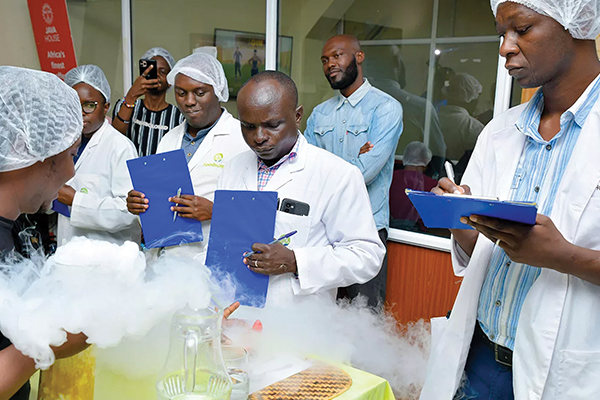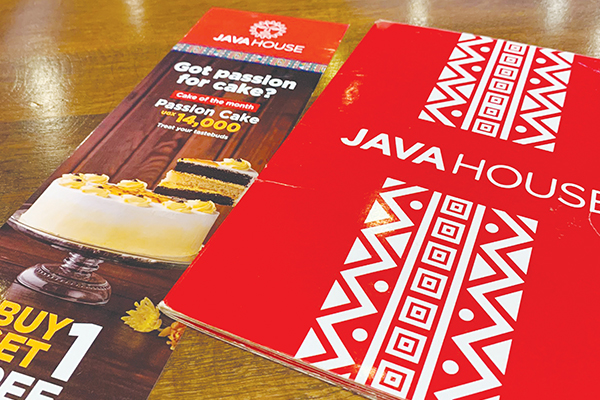#13
JAVA HOUSE AFRICA
In 1999, Java House Africa opened its doors in Nairobi’s Adam’s Arcade, marking the beginning of a coffee revolution in Kenya. Starting as a small coffee shop, Java quickly became a local favourite. Over the years, it evolved into a cosy diner-style restaurant, offering much more than just coffee. Today, Java is a popular spot, serving delicious coffee and a variety of meals.
With a friendly atmosphere and a commitment to quality, Java’s expansion has been remarkable, now boasting a network of 76 branches across Kenya. The most recent addition is in Meru Town, highlighting the company’s commitment to strategic growth. Additionally, the company has extended its presence with four branches in Uganda and three in Rwanda, solidifying its regional footprint and contributing to its overall success. It is worthy to note that Java is not just about coffee; it is about creating a space where people can gather, relax, and enjoy good food and great company.
In addition to its coffee legacy, Java has introduced two sister brands: Planet Yogurt, known for its tasty frozen yoghurt treats, and 360 Degrees Pizza, a go-to place for casual dining. Java has not just revolutionised the culinary landscape but has also become a trailblazer in championing Environmental, Social, and Governance (ESG) practices, by seamlessly integrating its commitment to environmental conservation, social impact, and good corporate governance into its core ethos.
Java proudly upholds its commitment to sustainable sourcing. Specifically, the renowned Kenya AA Arabica coffee, a Java specialty, exemplifies this dedication. Sourced from the nutrient-rich volcanic soils of high-altitude regions in Kenya, every batch of Kenya AA beans is meticulously hand-roasted by Java’s expert roasters. The process ensures not only a delightful nutty chocolate brown colour but also an aromatic and balanced coffee experience with a light finish – ideal for daily brewing. The commitment to quality extends across its offerings, including the dark-roasted AA Arabica beans for espresso, the carefully selected Uganda Kigezi Special from the abundant Arabica coffee grounds of the Kigezi Mountains, and the high-grade Arabica coffee from the hills of Western Rwanda’s Lake Kivu region.
Even in its decaffeinated Arabica coffee selection, Java maintains its rigorous standards, hand-selecting and roasting the beans daily. Additionally, Java’s dedication to sustainable sourcing extends to its Gold Label Tea, sourced exclusively from the most fertile tea-growing regions in Kenya, including the Aberdare Ranges, Kericho, and Kisii highlands. Through these meticulous sourcing practices, Java ensures that every cup brewed echoes its commitment to environmentally responsible and sustainable sourcing, aligning with the highest standards of ESG practices.

Furthermore, Java has taken a pioneering role in combating single-use plastics by adopting eco-friendly alternatives and reusable packaging. Embracing biodegradable materials like compostable cups and utensils made from renewable sources, Java is significantly reducing its environmental impact. Additionally, the restaurant chain encourages customers to choose reusable options, selling products such as ceramic and thermal coffee mugs. These initiatives not only minimise waste but also inspire environmentally conscious choices among its consumers.
Additionally, Java recently initiated the #ForestRehabilitation project at Karura Forest, with the aim of safeguarding and restoring terrestrial ecosystems, promoting sustainable forest management, combating desertification, and halting biodiversity loss. In a significant effort, Java’s team has already planted 3,000 indigenous trees, with plans to plant an additional 10,000 trees over the next five years.
In the sphere of social impact, Java prioritises its people. Serving as an equal opportunity employer, Java actively seeks passionate individuals to join its ever-growing family as it expands into new branches. Upon joining, employees become integral members of this close-knit community. Java invests in extensive training, empowering staff to progress from entry-level roles to becoming skilled baristas, waitstaff, or cooks. The company places immense value on its teams, providing competitive pay, annual leave, staff meals, and medical insurance. Moreover, Java fosters a vibrant work environment filled with mentorship, coaching, and abundant growth opportunities. With a robust Sacco program and a 5 percent pension contribution, Java ensures its employees not only have fulfilling careers but also benefit from financial stability and continuous personal development. This approach exemplifies Java’s dedication to creating a workplace where employees thrive.
What’s more, Java, through the Java Foundation, provides 1,000 daily meals to school children in an ongoing partnership with the Food for Education program. The collaboration was established with the aim of ensuring that these children are properly nourished and able to concentrate on their studies while in school. The decision to team up with Food for Education was driven by its exceptional work as a non-profit organisation within the public school system, employing the Tap2Eat FinTech platform that allows students to tap and enjoy their meals in under 5 seconds. Jointly, the two organisations recently identified Drive-inn Primary School in Ruaraka, adding to the scope of children with access to nutritious meals while attending school.

In the realm of good corporate governance, Java sets the bar high. Transparency, integrity, and accountability are the cornerstones of the company’s governance framework. The management operates with an open-door policy, encouraging communication and fostering a culture of trust and respect. Ethical practices and compliance with local and international regulations are non-negotiable, ensuring that Java operates with the highest standards of integrity. Over and above that, Java invests substantially in technology to enhance its understanding of consumers and internal operations.
The restaurant chain has implemented Microsoft Dynamics 365 for Finance and Operations, a comprehensive enterprise resource planning (ERP) system encompassing core financials, budgeting, asset management, inventory, production, and purchasing modules. This cloud-based Software as a Service (SaaS) tool ensures seamless management of Java’s business processes, integrating tightly with various selling systems, including restaurant point-of-sale systems and external entities like revenue authorities.
In essence, Java’s journey is not just about serving delectable dishes; it is about fostering a sustainable future, empowering communities, nurturing employees, and upholding the principles of good corporate governance. As the company continues to expand its culinary footprint, it does so with a profound sense of responsibility.
















